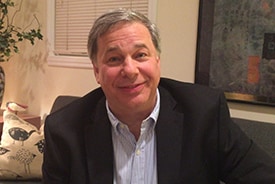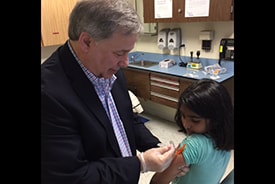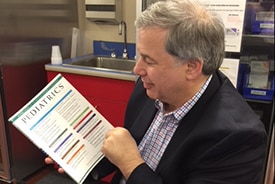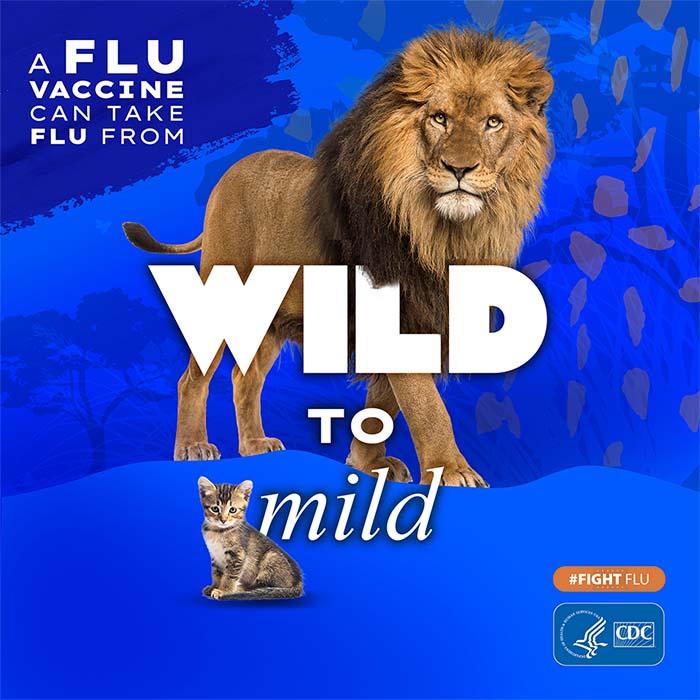Flu Fighter: Hank Bernstein
Meet flu fighter Dr. Hank Bernstein, Professor of Pediatrics at the Zucker School of Medicine at Hofstra/Northwell. Dr. Bernstein has advocated tirelessly for everyone to get vaccinated against seasonal flu on an annual basis. Dr. Bernstein is a trusted subject matter expert for all of the American Academy of Pediatrics (AAP) influenza-related work. Dr. Bernstein shares, “the most rewarding part of my work has been educating patients, parents, families, and health professionals about the flu.”
Dr. Bernstein provides expert insight and guidance to AAP to help protect children against deadly disease like flu. He is a leading voice on AAP’s annual policy statement on preventing flu in children with flu vaccines and ensuring healthcare providers are vaccinate to protect themselves and patients from flu. Additionally. Dr. Bernstein serves as a guiding member on multiple national vaccine advisory committees focused on flu.
Name: Henry (Hank) Bernstein, DO, MHCM, FAAP
Title: Professor of Pediatrics, Zucker School of Medicine at Hofstra/Northwell
Location: New Hyde Park, NY
- What role do you play in fighting flu?
I lead AAP’s work in ensuring that pediatric health care providers are making every effort to protect their patients and families from flu each year by providing them up-to-date information and guidance. I also work to develop and revise guidelines for control of infectious diseases in children and policy statements that emphasizes the importance of immunization of all health care personnel as a crucial step in protecting those at risk of health care-associated influenza. In my work, I help to educate, provide expert guidance, and influence policy that ensure we are making every necessary effort to protect children from infectious diseases, including flu. - What is the most rewarding part of your work?
Educating patients, parents, families, and health professionals about the flu! As a primary care pediatrician with decades of infectious diseases expertise, I have been honored and incredibly fortunate to be able to fulfill my lifelong passion of communicating, educating, and translating science into clinical settings, educational venues, policy-making, and media interactions to advance the health of children. - What is the most difficult part of your work?
In my mind, vaccines are amazingly effective and are the #1 public health achievement in the past century. I also know not everyone agrees with me. I am driven each day to do what I can to help increase the number of children and families that receive life-saving vaccines. Vaccine rates in the US may be relatively high overall, but there is definite room for improvement, as they are not nearly high enough. It is so extremely painful to treat children suffering from diseases that could have been prevented by vaccines. - How serious is flu? What should people know about the risk of flu?
The flu is an unpredictable virus that causes horrible disease around the world, resulting in unnecessary illnesses, hospitalizations, and death for so many people of all ages each and every year. There are millions of cases of flu each year and everyone is at risk to get it – young or old, rich or poor, black or white, healthy or with a chronic medical condition. Anyone can get seriously ill from the flu, but the very young, the very old, pregnant women and people with certain underlying health problems are at high risk of serious flu complications. - What would you say to those who are hesitant to get the flu shot?
Ask questions! I make sure to encourage all patients, parents, families, and health care workers to ask questions and voice concerns. It’s extremely important to be sympathetic to individual concerns, which are likely to be different for different people. Parents don’t want to see their children or family members get sick and health care workers don’t want their patients or colleagues to get sick. The flu vaccine is the best way we have to help prevent this all too common disease.



